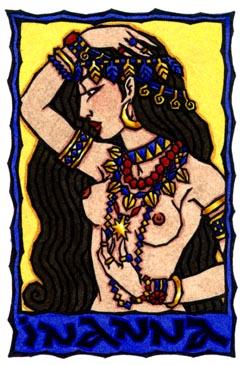
"Witches heal."
"All women are healers."
I've
written before about
healing. It's one of my abiding interests, and I intend to write about it more regularly. I'm in my third year of a program at a school for healing arts (what I often call the "mystery school" when I write about it here); I should know a little something about healing by now. I'll be writing about broader philosophical questions - what is healing? - and more practical matters - energy medicine, acupuncture, herbs, diet, and the like.
Right now I'm all in a tizzy about food. All my adult life, I've been interested in and driven by food trends. I was a vegetarian for 11 years, in the late 80s and 90s, and I attempted various periods of veganism during those years.
Diet for a Small Planet was my bible. (I still think Frances Moore Lappe is a saint, and there's a great granola recipe in that book, but leave out the soy grits - they'll make you fart.) I ate a lot of soy, including processed soy products like soy "meats" and "cheeses" (ugh). I did the Jane Brody thing. (Remember her?) I did
Andrew Weil's "8 weeks to ultimate health" (an eminently sensible plan, in my opinion, although I took it to extremes). I still go through my
Susun Weed herbal infusions phases. I started eating meat again on the advice of a nutritionist about five years ago. Philosophically, I stand for local, humanely raised animals/meat, and I shop and cook that way. But I also go on benders and eat bacon-cheeseburgers at Friendly's, and lunch buffet at Pizza Hut, and goddess-knows-what at Taco Bell. Despite my junk-food tendencies, I'm something of a gourmand, and I love simple, high-quality food, deliciously prepared. I've gone through periods of binging and periods of starving. My weight will be stable for years at a time, but I've gone through times of extreme loss and gain, my adult weight varying over 80 pounds.
My current phase is "
nourishing traditions," which I find too limiting (so I stray), but also interesting and delicious. I prefer
Nina Planck's approach to Sally Fallon's. Nina's a gourmand, like me. Sally is a dominatrix (and not in a good way). I find her tone in her writing to be angry, punitive, self-righteous, and a bit cultish. But there are good information and recipes in her book.
I'm currently seeing a nutritionist who likes the nourishing traditions approach and also believes in using a lot of
Standard Process supplements. I like my nutritionist a lot, though she's something of an evangelist. But I can't find any information critical of Standard Process or nourishing traditions, and that worries me. I want to be well-informed. I don't just want to take what I'm given, even by my very concerned, well-intentioned, expensive-for-me nutritionist. Still, I'm taking my copious supplements for my liver, adrenals, thyroid, etc., and I'm trying to eat less sugar (ha!) and more fruits and veggies.
Yesterday I went to see my acupuncturist, whom I hadn't seen in quite some time, and she was concerned and critical about the many-supplement approach. The upshot of all of this is that I have no idea what to think, who to believe, how to make decisions. I consider myself intelligent and well-informed, but I feel at sea. That makes it difficult to eat at all.
Thus a big question for me right now is, how do I heal myself - emotionally, spiritually, and physically - around food? How do I nourish myself? How do I clear out the noise, get quiet, and know for myself what to do? If you have a healing story around food, I'd love to hear it.
 (Painting by Kate Merriman)
(Painting by Kate Merriman)















